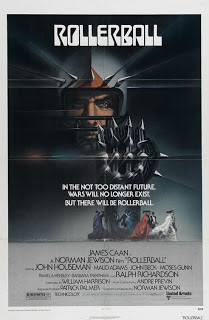I thought I’d start a new series (but no telling how assiduously I’ll follow my intent to post one of these every Sunday) on some of the films that influenced me during my more formative years; before and just as I was coming into RPGing. They won’t all have direct bearing on my gaming per se, but these are the films I grew up with, at the same time I was learning RPGs.
First up is Rollerball, from 1975. I was around 10 when this started coming on cable, and I watched it every chance I got. The plot is simple; in a future world where corporations run everything, one of the chief forms of entertainment is the sport called rollerball. It’s a brutal, fast-paced game where the point is to get a steel ball into a goal while skating (or riding motorcycles) around a track, and smashing an opposing player in the face is tacitly encouraged. Jonathan E (played by James Caan) is the undisputed master of the game, leading every season in scoring, knocking out opposing players, and having a legion of devoted fans.
It is this last part that worries the powers-that-be in the Energy Corporation (which owns the Houston team for which Jonathan plays), and they attempt to force him to retire, so that the game can be restored to its original purpose; “to show the futility of individual effort”. Eventually the rules of the game are changed so that it essentially becomes an everyone-tries-to-kill-Jonathan fest. The film ends ambiguously, with Jonathan prevailing against the entire New York team, but with many questions unanswered. Will the Energy Corporation take more direct action against Jonathan? Will his show of defiance spark some sort of revolt against the corporate society?
This is a movie that, despite the action and violence which appealed to my 10-year-old self, is very much a thinking person’s film. It raised a lot of questions in my young mind regarding society and economics, summed up by Mr. Bartholomew (played by John Houseman):
“Corporate society takes care of everything. And all it asks of anyone, all it’s ever asked of anyone ever, is not to interfere with management decisions.”
Heady stuff for a 10-year-old!
The production seems a little dated today (especially the computers and the clothing styles), but the message of the film holds up excellently. There are a lot of great subtle touches. For instance, the names all reflect an implicit sort of caste system that exists within corporate society. There are Executives, and everyone else. Executives are always referred to as Mr. so-and-so. The non-executives are always referred to by their first name (or nickname, in the case of Jonathan’s best friend and protégé Moonpie, played by John Beck, who ends up beaten into a coma by the Tokyo team as a warning to Jonathan about what could happen to him if he doesn’t do as he’s told). Most significantly, Jonathan, by virtue of his star status, occupies a twilight realm between the two castes. He alone is referred to by a first name and last initial.
The scene where Jonathan journeys to Switzerland to get answers to his questions about how corporate society got to be where it is, is fascinating. It turns out that the repository of knowledge, the liquid-computer Zero, is little more than a babbling idiot. The “world’s filing cabinet”, which the Executives used to use to assist in making their globe-spanning decisions, is incapable of answering the simplest query (and has completely lost all information on the entire 13th century, which makes the chief scientist of the center mourn not for the loss of knowledge, but rather express annoyance at the lack of organization it reveals). Even the Executives don’t bother to come any more.
If you look beyond the action and violence of the rollerball game itself, the film is an insightful look into how the mid-1970’s envisioned a world run entirely by corporate interests would look.










Thanks for the review — just added it to my Netflix queue. As an aside, it looks like they dumbed the movie down in the sequel.
In 2005, a new contest that mixes extreme sports with ancient gladiatorial combat is sweeping the world — but "Rollerball" stars Chris Klein and LL Cool J come to realize that the dangerous game they're playing might be rigged. Co-starring Jean Reno and Rebecca Romijn-Stamos as a hard-bitten fellow competitor, Rollerball (directed by John McTiernan) is a modern retake on the original 1975 sci-fi satire that starred James Caan.
Also — what you described wasn't "satire" to me, or do I misunderstand the word?
Oops — guess it isn't a "sequel" but a "remake" 🙁
Yeah, I should have mentioned the abominable remake. None of the nuance, none of the social commentary.
And no, I wouldn't characterize the 1975 version as "satire".
I got to say, one of my all time favorites. Still gives me chills to watch as they make the game rules more and more brutal, but Jonathan won't give in.
By a strange coincidence my fiction writing instructor at college studied under William Harrison who wrote Roller Ball Murder, the short story that the movie is based on.
This is officially my all-time favorite movie. While I've seen it several dozen times over the years, I'm still puzzled by what the director did with the last quarter of the film: While it's incredibly brutal (even by today's standards) it was incredibly exciting to watch. So was the director saying 'Look at this, this is violent and awful', or was he saying 'Look at you, this is violent and awful and you're enjoying it.'
Excellent movie. Green Ronin put out an RPG setting called Damnation Decade a couple of years ago that was inspired by 70s near future movies like Rollerball and Soylent Green. It was for d20 Modern, but it had a True20 conversion appendix in the back.